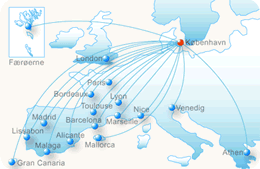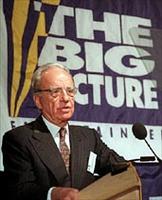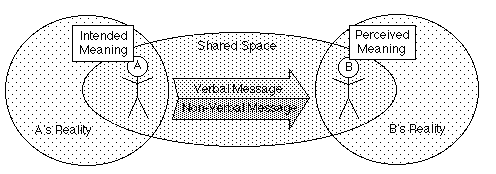| Saturday, March 13, 2004 |  |
|
|
|
 Wired has a good article about people working in computer companies in India, who do a lot of business that is out-sourced from the U.S. It can well freak out a lot of high-tech employees in the U.S. that what is a $70,000 a year job in their area is more like a $7,000 a year job in India. And it is today both technically and organizationally very possible for a large company to oursource big chunks of their work to a place like India. And what might freak out the guy in the U.S. even more is to realize that his counterparts in India are well-ecucated, professional, well-organized, and probably willing to work harder to get the job done. Wired has a good article about people working in computer companies in India, who do a lot of business that is out-sourced from the U.S. It can well freak out a lot of high-tech employees in the U.S. that what is a $70,000 a year job in their area is more like a $7,000 a year job in India. And it is today both technically and organizationally very possible for a large company to oursource big chunks of their work to a place like India. And what might freak out the guy in the U.S. even more is to realize that his counterparts in India are well-ecucated, professional, well-organized, and probably willing to work harder to get the job done.
I can certainly have the same fears. My expectation of how I will be paid is along the lines of the U.S. scale. But I also notice increasingly how there are programmers on the net from Russia or Asia who apparently can do large jobs for what I would consider impossibly small amounts of money. And they seem skilled and professional. I obviously can't compete on price with somebody who'll do for $200 what I'd need $5000 for.
But that Wired article makes it seem natural and positive. Which I'm sure it is. In a global free market, those who're best suited to do a job, and who can do it the best, for the lowest costs - of course it makes sense if they do it. It would be silly to try to use laws and protectionism to force people to needlessly pay 10 times as much for the same work. Efficient telecommunication tools allow high-tech industries and booming economies to grow and flourish in places where they otherwise couldn't. That's a good thing. That a lot of the business comes from other places than where the workers are does in no way have to be any problem.
So, the answer is of course to be flexible, and to do the things that ARE needed in one's local area, and which one can make a valuable contribution towards. So, maybe one might put the business together, or structure it, or sell it, or consult about it, rather than necessarily doing all the work locally. There are always things to do. Like, how Aparna Jairam, the project manager on the picture, quotes from the Bhagavad Gita:"Do what you're supposed to do. And don't worry about the fruits. They'll come on their own."
[ Information | 2004-03-13 05:35 | | PermaLink ] More >
|
|
| Tuesday, February 24, 2004 |  |
|
|
|
 Jimmy Carter has a blog. Well, at least he had one for some days while traveling in Africa this month. A few words: Jimmy Carter has a blog. Well, at least he had one for some days while traveling in Africa this month. A few words:"It is disturbing to observe the adverse effect of some U.S. policies on the less-developed nations. Despite helpful contributions of USAID and military assistance in Mali, for instance, the grossly exorbitant cotton subsidies for mega-farms in America cost the country far more than all the combined assistance from rich nations. Malians produced more cotton last year than any other African country and it is their number one export, but they had to sell it with no profit in order to compete with the heavily subsidized U.S. crop. Also, there is a heavy-handed effort by Washington to force other countries to violate the basic premises of the newly established International Criminal Court. Our government threatens to withhold military assistance unless they will guarantee that U.S. citizens be immune to possible punishment for war crimes or other atrocities. Another interesting development has been the efforts from Washington to elevate the issue of terrorism, and American diplomatic officials are forced to participate in this over-emphasis. We were warned strenuously about the new terrorist dangers that had arisen when we planned our visit to Timbuktu and Mopti. I decided that we would take a chance, and when we met with representatives of a dozen donor agencies in Bamako, I asked if any of them had any evidence of increased violence in the area or terrorist threats. The unanimous response was laughter." How about running for president again, Mr.Carter. It is apparently hard to find humble and knowledgable folks who're willing to roll up their sleeves.
[ Information | 2004-02-24 17:34 | | PermaLink ] More >
|
|
| Sunday, February 22, 2004 |  |
|
|
|
 I explored what might be available for us in terms of possibilities of catching Danish TV by satellite, and since it was a little hard to figure out, I've better record here what I found so others can find it. I explored what might be available for us in terms of possibilities of catching Danish TV by satellite, and since it was a little hard to figure out, I've better record here what I found so others can find it.
There was already a little satellite parabola on the house here. So, in principle you just add a decoder. And we connected a cheap digital decoder for free channels. The antenna appeared to be pointed to the Astra satellite. Which right away provided 52 channels, of which a handful are encrypted so we can't see them, and of which one is in French, one is German news in English, and the rest are German channels. Which certainly expands the selection, but it isn't what we most would want. We could probably adjust it a bit to point to the Hot Bird satellite, which would give a somewhat different selection. Beyond that I start getting really confused about what's really available.
But what we would really most like is Danish TV. Which is a rather different story. If we had a 2M or so parabola we could receive Danish Canal Digital pay packages on the Thor II satellite. Which would be a huge antenna.
But there have on and off been other possibilities, as least for the main state-run Danish TV channels. Transmissions had been stopped for a while because there were few paying subscribers in southern Europe, and because the signal was widely pirated. The situation was in part remedied by networking and lobbying by Radio Solymar which is a focal point for Scandinavian residents particularly in Southern Spain. There's a lot more Scandinavians there than for example here in the south of France. Anyway, they persuaded DR (Denmark's Radio) to put the signal up again. So, it can be received at the Intelsat 707 satellite on spot 2. Which for us in Toulouse would mean a 80cm parabola. Still bigger than what we have, but certainly a lot more possible. But it isn't free. DR charges 284 euro per year for the subscription. And the broadcast is encrypted so one needs a decoder with the proper CONAX encryption module. Radio Solymar sells a decoder pre-configured for 369 euro. Which is pretty much also the price range for other decoders that can handle the encryption.
But it should soon get easier and better, although probably not cheaper. In the third quarter of 2004 the Telenor satellite company will be switching their services from the about-to-be-junked Intelsat 707 to the fancy new Intelsat 10-02 satellite. Broadcast area for spot 1 is here. Which puts most of Europe inside the sweet spot. Meaning that even a little parabola like ours will do fine. And Telenor has made a point of keeping the DR broadcast even if they might not make much money on it. But hopefully they'll show something else worth watching as well.
Well, it is not that Danish TV is that fantastic. I mean, "Who wants to be a millionaire?" isn't better in Danish than in German or French. But there are certain things we just have a nostalgic joy in watching. Actual Danish series like "Rejseholdet" or "Krøniken", or little entertainment quiz shows with celebrities we still remember. My mom is sending tapes once in a while, which is great, but it would of course be nicer to be able to just turn it on.
[ Information | 2004-02-22 17:56 | | PermaLink ] More >
|
|
| Monday, February 16, 2004 |  |
|
|
|
 Thomas says: Thomas says:"On the 29th of March Maersk Air will open the route Copenhagen to Toulouse, which will be the first direct flight since I arrived in Toulouse. I have done a few searches and it seems like they only fly from Toulouse to Copenhagen on Mondays which is not that good since it rules out weekend visits, but the positive thing is that the trip will only take 2 hours and 15 minutes and will cost around 108 Euro per adult. Before you had to fly through Germany, Paris or Amsterdam and the cheapest tickets cost around 250 Euro." That's great news, even if it is just Mondays! Easier for our family to get here, and more likely that we can make the trip home more often. Gee, cheap direct flights to anywhere but London and Paris seemed like such an unobtainable luxury.
[ Information | 2004-02-16 14:56 | | PermaLink ] More >
|
|
| Sunday, February 15, 2004 |  |
|
|
|
 Via Ben Hammersley, London Review of Books has a review about Rupert Murdoch biographies. Pay attention to the figures: Via Ben Hammersley, London Review of Books has a review about Rupert Murdoch biographies. Pay attention to the figures:And then Chenoweth has found, looking at the accounts, that the company’s profits, declared in Australian dollars, were A$364,364,000 in 1987, A$464,464,000 in 1988, A$496,496,000 in 1989 and A$282,282,000 in 1990. The odds that such figures were a happy coincidence are 1,000,000,000,000 to one. That little grace note in the sums is accountant-speak for ‘Fuck you.’ Faced with this level of financial wizardry, all the ordinary taxpayer can do is cry ‘Bravo l’artiste!’ Yeah, I wish I had accountants who could make my profit turn into such pretty numbers. Of course part of the trick is to have some surplus profits that you can hide away to the exact amount you want.
[ Information | 2004-02-15 13:28 | 0 comments | PermaLink ]
|
|
| Wednesday, January 28, 2004 |  |
|
|
|
|
|
| Tuesday, January 20, 2004 |  |
|
|
|
Dina passes on some excellent stuff about social entrepreneurship and how it might relate to social software. Let me just post the whole thing here, that's easiest.
Judith, who has recently taken over writing at the Social Software Blog, has a neat summary of a wonderful paper - The Meaning of Social Entrepreneurship by J. Gregory Dees, for the Stanford Business School's Center for Social Innovation. Its a paper written five years ago on 'business' and 'social' entrepreneurship.
A valuable find and timely reflection when there is so much activity around social software and social networks. It made me reflect on who really is a true Social (Software) Entrepreneur, and provided some clues into defining the very term. Quoting from Judith's post : "In this paper Professor Dees gives a brief history of the evolving definition of 'entrepreneur': early 19th century French Economist, Jean-Baptiste Say: "The entrepreneur shifts economic resources out of an area of lower and into an area of higher productivity and greater yield." early 20th century economist Joseph Schumpeter: "the function of entrepreneurs is to reform or revolutionize the pattern of production." They can do this in many ways: "by exploiting an invention or, more generally, an untried technological possibility for producing a new commodity or producing an old one in a new way, by opening up a new source of supply of materials or a new outlet for products, by reorganizing an industry and so on."
Peter Drucker: "the entrepreneur always searches for change, responds to it, and exploits it as an opportunity." Dees goes on to interpret Drucker's definition as: "Entrepreneurs have a mind-set that sees the possibilities rather than the problems created by change." Howard H. Stevenson, a leading theorist of entrepreneurship at Harvard Business School, defines the heart of entrepreneurial management as "the pursuit of opportunity without regard to resources currently controlled." Professor Dees - borrowing "the notions of value creation from Say, innovation and change agents from Schumpeter, pursuit of opportunity from Drucker, and resourcefulness from Stevenson" - asserts that 'social entrepreneurs' play the role of change agents by: * Adopting a mission to create and sustain social value (not just private value),
* Recognizing and relentlessly pursuing new opportunities to serve that mission,
* Engaging in a process of continuous innovation, adaptation, and learning,
* Acting boldly without being limited by resources currently in hand, and
* Exhibiting a heightened sense of accountability to the constituencies served and for the outcomes created. In conclusion Dees states: "Social entrepreneurship describes a set of behaviors that are exceptional. These behaviors should be encouraged and rewarded in those who have the capabilities and temperament for this kind of work. We could use many more of them. Should everyone aspire to be a social entrepreneur? No. Not every social sector leader is well suited to being entrepreneurial. The same is true in business. Not every business leader is an entrepreneur in the sense that Say, Schumpeter, Drucker, and Stevenson had in mind. While we might wish for more entrepreneurial behavior in both sectors, society has a need for different leadership types and styles. Social entrepreneurs are one special breed of leader, and they should be recognized as such. This definition preserves their distinctive status and assures that social entrepreneurship is not treated lightly. We need social entrepreneurs to help us find new avenues toward social improvement as we enter the next century."
Judith ends by asking : "Based on Professor Dees definitions, both borrowed and advanced, of 'Social Entrepreneurship' - Who do you think are the 'Social Entrepreneurs' of the 'Social Software' movement?" One name from India that comes to mind is Rajesh Jain. He's a true change agent, in his success at building sustainable collaborative systems and in his vision of 'socializing' India through technology. Help Judith build a list - who would you choose and why - do leave a comment here or at Judith's blog.
Super. I want to be a Social Entrepreneur too.
[ Information | 2004-01-20 14:21 | | PermaLink ] More >
|
|
| Sunday, January 18, 2004 |  |
|
|
|
Doc Searls:Eric Raymond: How webbing books doesn't hurt sales. Interesting stuff about "identity goods" among other relevant arcana.
Data: Cluetrain continues to sell at Amazon (listed at that link as #928) while the whole thing is online as well. I hope the principles behind this become very public and widespread common sense. It not only doesn't hurt sales to give a book away on the net, it probably helps them. And the same applies to other media. Anyway, here's some of what Eric Raymond says:"My four books do not a controlled experiment make, but the thirteen years of experience with simultaneous print and Web publication that I've had suggests that Web availability has boosted the sales of the print versions tremendously. And my publishers agree. Even in 1991 I didn't get resistance from MIT press, and Addison-Wesley was positively supportive of putting my most most recent one on the Web.
I'm one of a handful of technical-book writers who publishers treat like rock stars, because I have a large fan base and my name on a cover will sell a book in volumes that are exceptional for its category (for comparison my editor at AW mentions Bruce Eckel as another). I'm not certain my experience generalizes to authors who aren't rock stars. On the other hand, it's more than possible that I'm a rock star largely because I have been throwing my stuff on the Web since 1991. It's even likely — after all, I was next to an unknown when I edited The New Hacker's Dictionary." Making your stuff easily and widely available is a great way of becoming known, and a great way of becoming somebody who's work sells well. It shouldn't even be any kind of surprise.
[ Information | 2004-01-18 09:49 | | PermaLink ] More >
|
|
| Thursday, January 15, 2004 |  |
|
|
|
 Several people have mentioned the new documentary "The Corporation". It was screened at the 2003 Vancouver International Film Festival. It is premiering in a few theatres in Candada around now. Read the review, it is very cool. Several people have mentioned the new documentary "The Corporation". It was screened at the 2003 Vancouver International Film Festival. It is premiering in a few theatres in Candada around now. Read the review, it is very cool.A lot of documentaries get a rise out of their audience. Some even invoke social change, or at the least some serious reflection upon our place in the world. But I can safely say I've never seen an audience so moved, en masse, to explore actual social activism on a grand scale as the audience who watched this three hour masterwork. The first standing ovation I've seen delivered at the Vancouver Film Festival was not only deserved, but also very long, and what followed the screening overshadowed even that outpouring of emotion.
The Corporation could never have been made in the USA. It took a Canadian team to put this work together, and it'll take far more than legal threats and intimidation to kill it. An almost three hour look at the past, present and future of corporations as a business entity, you'd be forgiven for rolling your eyes and giving the thing a miss if you only had a loose synopsis to go on.
But where this documentary matters is in the details - the nasty, disgusting, gory details of what the corporation has done to this world, what it's doing today, and what we can expect it to do tomorrow if we don't get our freaking act together.
The extreme right 'love it or leave it' crowd are no doubt already starting to yell "Lefty propaganda," but this isn't an Anti-Bush attack on all things capitalist. This isn't hippy rhetoric or new age spin or a call to the communes. It isn't hoity toity technospeak or boring talking-head PBS filler. What The Corporation is, is a healthy dose of well-researched, deeply explored, stunning information that can not possibly leave you, as an audience member, in any condition but stunned, dismayed, and outraged.
Maybe you know it all already. If you're like me, you read the papers, you know who's buying who and that the unstoppable bulldozer of globalization is hurting a lot of people. If you're like me, you're disgusted that TV news has become a wrestling match to decide which party has the best 'spin', and you might have even learned enough about global politics to be sick to death of what you're seeing in the world today.
But The Corporation will teach you things you never dreamed of. it will change you. It will ruin your day, but give you reason to get up in the morning - determined to make change. I can't wait to see it, and I hope it somehow manages to get wide distribution, even in the U.S. I have no doubt it will play in the theatres here in France. Even Noam Chomsky shows in regular theatres here.
And for the record, I think corporations should be banned ASAP. Not business, not free enterprise, not groups of people doing things together, but the corporation as an artificial legal person.
[ Information | 2004-01-15 13:53 | | PermaLink ] More >
|
|
| Tuesday, December 16, 2003 |  |
|
|
|
 Remember DTC, the little known 20 trillion dollar company that holds most stocks in the world in the name of its subsidiary "Cede & Co"? Well, this fellow just found out about them when he was trying to locate $600 worth of stocks he thought he owned, after he was told that they had been transferred to Cede & Co. And he actually called them up, trying to get some answers. Without very much luck, as he's just an individual, rather than a "participant". Anyway, he continues looking for more information on the net. And finds good things, like this letter concerning a group of stock brokers and stock transfer companies who tried to withdraw from their contract with DTC,, and found out that they couldn't. DTC is a monopoly. And apparently they run it a bit like a black box, where even brokerage houses can't really learn all the details about what happened with their stocks. There are irregularities like stocks being oversold, meaning that more are being offered than all the actually outstanding shares of the given companies. Very interesting letter. Remember DTC, the little known 20 trillion dollar company that holds most stocks in the world in the name of its subsidiary "Cede & Co"? Well, this fellow just found out about them when he was trying to locate $600 worth of stocks he thought he owned, after he was told that they had been transferred to Cede & Co. And he actually called them up, trying to get some answers. Without very much luck, as he's just an individual, rather than a "participant". Anyway, he continues looking for more information on the net. And finds good things, like this letter concerning a group of stock brokers and stock transfer companies who tried to withdraw from their contract with DTC,, and found out that they couldn't. DTC is a monopoly. And apparently they run it a bit like a black box, where even brokerage houses can't really learn all the details about what happened with their stocks. There are irregularities like stocks being oversold, meaning that more are being offered than all the actually outstanding shares of the given companies. Very interesting letter.
[ Information | 2003-12-16 18:20 | | PermaLink ] More >
|
|
|
|
 Wired has a story about University of Maine's Still Water new media lab, which has a new project called the Pool. Which is a collaborative online environment for creating and sharing images, music, videos, programming code and texts. And the interesting part is that it is a COPYRIGHT-FREE zone. Wired has a story about University of Maine's Still Water new media lab, which has a new project called the Pool. Which is a collaborative online environment for creating and sharing images, music, videos, programming code and texts. And the interesting part is that it is a COPYRIGHT-FREE zone."We are training revolutionaries -- not by indoctrinating them with dogma but by exposing them to a process in which sharing culture rather than hoarding it is the norm," said Joline Blais, a professor of new media at the University of Maine and Still Water co-director.
"It's all about imagining a society where sharing is productive rather than destructive, where cooperation becomes more powerful than competition," Blais said. Now, imagine that. Teaching sharing. Out in the open. That's wonderful. The only sad part is that anybody at all might consider that to be a somewhat provocative thing to do. That we have to stretch our minds a bit and glance over our shoulders in order to imagine a society where sharing is productive rather than destructive, where cooperation becomes more powerful than competition. I mean, OF COURSE IT IS!! Or, rather, it is the wrong way to put it. Competition is not the opposite of cooperation. They have a sort of synergy. Free copyright-free products are competing or cooperating depending on what makes the most sense. The enemy is not competion, but monopoly ownership of *anything*. Monopoly ownership of ideas and designs in particular is the enemy of cooperation, competition, sharing and freedom of choice.
[ Information | 2003-12-16 09:59 | | PermaLink ] More >
|
|
| Monday, December 15, 2003 |  |
|
|
|
 Paul Hughes at Planet P talks about the battle for the freedom of the Internet. As a starting point there is The Digital Imprimatur by John Walker, which is a rather pessimistic view. "How big brother and big media can put the Internet genie back in the bottle". Indeed, there are a number of powerful, well-funded groups, backed up by corrupt politicians, that are working very hard on making the Internet subservient to their wishes and their economic interests. That covers everything from the U.S. government's insistence that they should be able to eavesdrop on anything, to big media companies implementing DRM, "Digital Rights Management", which is a euphemism for technology that will control 100% how, when, where and by whom a given piece of media is used, down to the chip level. The equivalent of self-destructing CDs, just more pervasive. It all looks pretty grim what such folks have in mind. Some of what Paul has to say is: Paul Hughes at Planet P talks about the battle for the freedom of the Internet. As a starting point there is The Digital Imprimatur by John Walker, which is a rather pessimistic view. "How big brother and big media can put the Internet genie back in the bottle". Indeed, there are a number of powerful, well-funded groups, backed up by corrupt politicians, that are working very hard on making the Internet subservient to their wishes and their economic interests. That covers everything from the U.S. government's insistence that they should be able to eavesdrop on anything, to big media companies implementing DRM, "Digital Rights Management", which is a euphemism for technology that will control 100% how, when, where and by whom a given piece of media is used, down to the chip level. The equivalent of self-destructing CDs, just more pervasive. It all looks pretty grim what such folks have in mind. Some of what Paul has to say is:"Currently the internet is very centralized. People say it isn't, but all the main functions, the DNS servers, and the main pipes all go thru major carriers and companies pipelines. The protocols for this network are governed by ICANN and soon possibly the UN itself. More and more people are getting online thru large cable and telco carriers, making access all the more centralized and controlled by the biggest players. All this is adequately described in the Digital Imprimatur above. There are good and bad reasons for the lockdown, but it still will be that - a lockdown. And there is probably little any one of us can do to stop it's inevitable occurence.
However, what is to stop you, me or anyone else from setting up our own seperate but parallel adhoc local network in our neighboorhoods?
Nothing.
Using very cheap off-the shelf hardware available at radio shack anyone will soon be able to build a GNU Radio that will be able to communicate with anyone else's GNU Radio. These radios will be general purpose wireless computing devices that communicate over the open airwaves. Regulated or not, these devices will flourish underground rapidly as there power to connect and network become apparent. It's only a matter of time before a general purpose GNU Radio ends up in the hands of anyone who wants to get one. While the internet gets more locked down, Microsoft implements strong DRM, and even more ominious lockdowns are put in place along the network itself, more and more hobbiest will be computing and communicating with these handheld units and modified laptops and other devices. The chips running from them will also be modified, cheap and out of control. Certainly they will not be as powerful as the latest Intel or AMD processors with all the DRM built into them, but they will function as general purpose devices without any of those restrictions. Their range could easily extend beyond a mile, and I also suspect you'll start seeing people add rogue (maybe at some point illegal) solar powered repeaters and routers on mountains tops to help one commuity of GNU users communicate with another community." OK, so let's fight. Big money is going to put restrictive technologies in place that will keep them holding the strings, and us holding the short end of the bargain. We need alternative technologies to match whatever they come up with.
Proprietary Software vs. Open Source: That is looking pretty good there. Companies like Microsoft are trying hard to convince governments that open source is somehow dangerous and insecure and that it should preferably be outlawed. That is not working, as it just isn't true. And even many Big Companies are looking more and more towards open source. Economic views tend to favor open source, as it is generally a lot cheaper.
Chips with DRM vs. Generic Chips: Will we be forced to use processors that have a built-in backdoor owned by BigMedia? If it were up to Intel and Microsoft we would. But as long as there is a clear choice, that kind of features would tend to be shunned. Intel introduced Pentium IIIs that had a built in ID, so one could track the activity of people's computers. Nobody seemed to like it, people were reluctant to buy it, and I don't think they repeated it in the following processors. Would they really be able to get all chip production plants to agree on designs with such features? I doubt it. Even if it became a law in the U.S. I don't believe that chip plants in Taiwan would just go along with it.
Operating Systems with DRM vs. Operating Systems owned by you: Well, lots of people have actually bought and paid for Windows XP, despite that it has a mind of its own and might stop your access to your own computer based on instructions from Redmond. Why? Well, it is the next version and lots of it looks nice. Apple has gotten away with sneaking DRM into iTunes. Which is accepted because they've done it fairly reasonably and it is a very useful program. The operating system arena is tricky, because people tend to get attached to their OS, and will upgrade to the next version even if it happens to include something oppressive and undesirable.
Centralized Routing vs. Ubiquitous Mesh: Yes, despite how we usually think about the Net, most of the traffic is traveling through a relatively small number of core routers. I can't send a message from Toulouse to Los Angeles without going through some large ISPs, a very limited number of pipes going under the ocean, and some large routers at key points. These points can both be easily monitored, and they can be filtered, and they could be turned off selectively. There is no grassroots infrastructure for the net. So, that is looking bad.
It would be very nice if we had UltraWideBand packet radios, driven by software, and they could be hooked up in a Mesh network covering the whole planet, and which didn't have central points that most of the traffice went through. Very nice. And there probably isn't any good technical reason why we don't. It is just easier to plug into Covad or France Telecom and pay 39.95 per month and accept whichever way they do things.
Owned Spectrum vs. Public Spectrum: A problem is the antiquated model that the air waves should be owned by specific groups. That means both that they're very badly utilized and that a lot of very useful public benefit activities are hindered. WiFi has taken off in a great way with only a very small piece of bandwidth, which is shared with garagedoor openers and microwave ovens. Lots more could be done if the airwaves were more available. Or if the stops were removed from using UltraWideBand, which uses not one particular frequency, but basically all of them at the same time, which makes the bandwidth practically unlimited.
So, is the answer to just implement these things whether it is legal or not?
Well, I'd say that the strategy ought to be to put technologies in place that are inherently controlled by their users or grassroots groups, rather than central control, and which can be easily configured for a variety of uses. Like that GNU Radio thing. Or mesh network protocols. Or like Linux. Or like file sharing. Or open media formats like OggVobis. Or open encryption standards. Nobody's saying they will be used for anything illegal, but they could, if the climate turns too oppressive.
I think it is essential to share good information about what is going on, and what the alternative efforts are. Important to make the issues known, so that even non-techies know what they are. Anybody who buys a computer or a TV should know what DRM is and what the intention with it is, and what the alternatives are.
Here are a few informative sites from people who work on keeping technology open:
Freedom to Tinker
Abusable Technologies Awareness Center
Electronic Frontier Foundation
Electronic Privacy Information Center
The Internet is for Everyone
CopyFight
Lawrence Lessig
[ Information | 2003-12-15 08:17 | | PermaLink ] More >
|
|
| Wednesday, December 10, 2003 |  |
|
|
|
Via Dina, Debbie Well, taking a crack at defining blogging. Yes, nothing very new, but gives an idea for people who think it is strange.Blogging Is... - A form of unedited, authentic self-expression
- An instant publishing tool
- An online journal with freshly updated content
- Amateur journalism
- Something that will revolutionize the Web (think RSS feeds)
- A way to create community with your voters, er... readers (think 2,200 comments posted to the Dean for America blog in one day)
- An alternative to mainstream media (think InstaPundit by Glenn Reynolds and TalkingPointsMemo by Joshua Micah Marshall)
- A tool to teach students how to write
- A new way to communicate with customers (think Ray Ozzie, CEO of Groove Networks)
- A new form of knowledge management inside big companies
- A way for a bunch of navel-gazers to communicate with one another
- Something to keep you occupied when you’re unemployed (more people than care to admit fit into this category… have you noticed?)
- A way to think and write in short paragraphs instead of a long essay (which no one has time to read anyway)
- Your email to everyone, as A-list blogger Doc Searls puts it (i.e., a way to stay in touch with family and friends)
- A silly word that’s fun to say (“Gotta go blog now….”)
- A way of writing with a distinct voice and personality (think Halley Suitt)
- Something to talk about at cocktail parties (“I blogged Seth Godin and he blogged me back...”)
- A URL to add to your resume (as in TokyoTim, my 23-year-old son, who’s working as an English teacher in Japan for a year)
- Something else to do with your mobile phone... think audio blogging and moblogging
- Something you don’t want your mother to read: what my mother says about blogging
And, since we're on the subject Xeni Jardin has a nice article on what blogging is as well.What are weblogs? Regularly-updated websites that typically combine some mix of first-person commentary, web links, images, and news clips, and present the blend in reverse chronological order. Some are solo journals -- personal diaries open to the world; websites that function like ultra-low-budget reality TV shows where aspiring exhibitionists can document every personal detail of daily life, from boyfriends to phone bills to what they ate for breakfast. Other blogs are like collaborative online magazines that feature multiple editorial voices. Blogs can be produced by anonymous individuals with no professional writing experience just as easily as they can by career journalists or celebrity technopundits. In case anybody has missed it, "blog" is short for "weblog". It might also be called a "newslog", a "journal", or a number of other things, which might depend on what exactly you use it for.
[ Information | 2003-12-10 15:17 | | PermaLink ] More >
|
|
| Wednesday, November 26, 2003 |  |
|
|
|

One of the most simple and useful ways of sorting out arguments and communication difficulties is to work on getting clear on what people really were trying to say.
Most conflicts are merely rooted in misunderstandings. Most communications that one takes offense to weren't really meant the way the were received.
Words are so imprecise, even when we think they're not. We don't all attach the same meanings to the same words. A word is just a pointer. What it points to for each of us depends on our experience and our assumptions.
So, the simple exercise to do before you start fighting back is to read back in your own words the meaning you thought you received."What I hear you say is that ...
Is that what you mean?" And very often you'll find that you didn't get it right at all, but the person really meant something else than what you thought.
Even if you get confirmed that the person actually was being a bit mean and trying to put you down, the clarification makes it so much easier to respond appropriately.
The truth tends to free things up. There's a very recognizable feeling of relief that takes place when two or more people suddenly realize that they're understanding each other, and then they actually can look at the subject matter together. Even if it turns out that they don't agree or see things the same way at all. We don't have to agree. But it helps greatly when we understand each other.
For more details, try this Communication Model.
[ Information | 2003-11-26 09:44 | | PermaLink ] More >
|
|
| Tuesday, November 25, 2003 |  |
|
|
|
Article in Christian Science Monitor about whether college teaches you to think or not.While pondering a problem in a plant biology course at Ohio University one semester, John Withers suddenly realized something unusual was going on: This class was actually requiring him to think.
Thinking is presumed to be the bread and butter of higher education. Beyond simply getting a diploma to land a job that pays well, the promise of sharpening thinking skills still looms as a key reason millions apply to college.
Yet some say there is a remarkable paucity of critical thinking taught at the undergraduate level - even though the need for such skills seems more urgent than ever. And then there some good examples of professors and classes that actualy seem to be doing the right stuff.
Years ago when I frequently was interviewing and hiring computer programmers I noticed that a large percentage of people with computer science degrees had gotten their ability to think and solve real problems completely destroyed, if they had it to begin with. I.e. the majority were unable to write a simple program to solve a simple problem, and unable to even think systematically. Rather they tended towards having a very impressive resume, and an inclination towards having many interesting things to say. But when I actually gave them a test, it was surprising how poorly most people did. Kids fresh out of high school were usually significantly more able to solve a real problem than somebody with a masters degree in computer science.
But if they could both learn about a lot of stuff AND actually develop their ability to be creative and think critically - that would really be something.
[ Information | 2003-11-25 11:48 | | PermaLink ] More >
|
|
| Friday, November 21, 2003 |  |
|
|
|
There's something really infuriating about companies that build their business on (mis-)using some existing laws to screw everybody but themselves. Well, the good part of it is that it exposes bad laws, and makes loads of people want to change them, but in the short term such companies will often get away with it.
Prime areas for legal, but anti-social, perverted and criminal business opportunities are in the fields of patents and copyrights. If you play your cards well, it is better business than dealing drugs, because the courts will protect you, and you don't need to produce anything valuable at all. You just need lawyers who will work for percentages.
The MPAA (movie companies' association) and RIAA (record labels' association) are continuously busy with that kind of activities. Instead of figuring out how to evolve their business towards what people want nowadays, they try to protect their old business by threatening and extorting and suing people. And they keep large volumes of perfectly useful movies out of circulation, just because they own them and don't know how to make money with them.
Several software related companies that are failing in having a real business have adopted an approach of extorting other companies. A company called SCO, which bought key pieces of UNIX from Novell, attracted investors based on a plan of extorting money from UNIX licensees and Linux users. It is an incoherent and wacky plan which probably won't work, but they're trying hard, having spent $10 million just in laywer's fees to attack other companies. More here and here.
Lots of questionable legal activity springs up around bogus patents. E.g. Altnet is a company that made a business off of creating spyware to infiltrate your computer. They now bought a patent which supposedly would allow them to extort money off of peer2peer networks. And the patent itself is a trivial technique they had no part of creating in the first place. Read about it here.
Why do I call them "criminal"? My definition of criminal isn't about whether it is legal or not, but rather that you're bereaving others of the real value of their work and creativity and amassing value for yourself that you didn't create. Nowhere is that quite as obvious as when it comes to the "ownership" of ideas.
[ Information | 2003-11-21 15:15 | | PermaLink ] More >
|
|
|
|
 WorldChanging is a splendid new weblog by Alexis Steffen, Jamais Cascio, and other contributors. Its motto is "Another world is here". Lots of good, positive material. WorldChanging is a splendid new weblog by Alexis Steffen, Jamais Cascio, and other contributors. Its motto is "Another world is here". Lots of good, positive material.
[ Information | 2003-11-21 15:15 | | PermaLink ] More >
|
|
| Monday, November 10, 2003 |  |
|
|
|
MIT Technology Review has introduced an experiment and game called "Innovation Futures". It is like a stock market where one can bet on the futures of all sorts of events, and you can buy and sell contracts. The events are real, but the money is not. However, the people who're most successful in the game will win some nice prices.
This is rather intriguing. Might something like this possibly be meaningful as a democratic mechanism? You know, if the game will reveal how much faith we have in various future scenarios, and who's the best at predicting which scenarios actually come to pass - does that not translate into something we can use to organize society by? Wouldn't the best leaders by those who are most in synch with public sentiments? I'm not sure if there's a correlation. After all, the 'real' stock market will rather reward those who can predict public mis-conceptions and profit from them, without much regard to the final outcomes.
[ Information | 2003-11-10 16:43 | | PermaLink ] More >
|
|
| Thursday, October 30, 2003 |  |
|
|
|
 There is a busy little private company you probably never have heard about, but which you should. Its name is the Depository Trust & Clearing Corporation. See their website. Looks pretty boring. Some kind of financial service thing, with a positive slogan and out there to make a little business. You can even get a job there. Now, go and take a look at their annual report. Starts with a nice litte Flash presentation and has a nice message from the CEO. And take a look at the numbers. It turns out that this company holds 23 trillion dollars in assets, and had 917 trillion dollars worth of transactions in 2002. That's trillions, as in thousands of thousands of millions. 23,000,000,000,000 dollars in assets. There is a busy little private company you probably never have heard about, but which you should. Its name is the Depository Trust & Clearing Corporation. See their website. Looks pretty boring. Some kind of financial service thing, with a positive slogan and out there to make a little business. You can even get a job there. Now, go and take a look at their annual report. Starts with a nice litte Flash presentation and has a nice message from the CEO. And take a look at the numbers. It turns out that this company holds 23 trillion dollars in assets, and had 917 trillion dollars worth of transactions in 2002. That's trillions, as in thousands of thousands of millions. 23,000,000,000,000 dollars in assets.
As it so turns out, it is not because DTCC has a nice website and says good things about saving their customers money that they are trusted with that kind of resources. Rather it is because they seem to have a monopoly on what they do. In brief, they process the vast majority of all stock transactions in the United States as well as for many other countries. And - and that's the real interesting part - 99% of all stocks in the U.S. appear to be legally owned by them.
In the old days, when you owned stocks you would have the stock certificates lying in your safe. And if you needed to trade them, you needed to get them shipped off to a broker. Nowadays that would be considered very cumbersome, and it would be impractical to invest via computer or over the phone. So the shortcut was invented that the broker would hold your stocks instead of you. And in order for him to legally be able to trade them for you, the stocks were placed under their "street name". I.e. they're in the name of the brokerage, but they're just holding them in trust and trading them for you. And you're in reality the beneficiary rather than the owner. Which is all fine and dandy if everything goes right. Now, it appears the rules were then changed so the brokers are not allowed any longer to put the stocks in their own name. Instead, what they typically do is to put the stocks into the name of "Cede and Company" or "Cede & Co" or some such variation. And the broker might tell you that it is just a fictitious name, and will explain why it is really more practical to do that than to put it in your name.
The problem with that is that it appears that Cede isn't just some dummy name, but an actual corporation that DTCC controls. And, well, if you ask anybody about this, who actually knows about it, they will naturally tell you that it is all a formality. To serve you better, of course. And, well, maybe it is. DTCC seems like a nice and friendly company. It is a private company, owned by the same people (major U.S. banks) who own the Federal Reserve Bank. And if they all stick to their job, and just keep the money and your stocks flowing smoothly, I'm sure that is all well and good. But if somebody at some point should decide otherwise, and there's a national U.S. emergency and/or the U.S. government becomes unable to pay its debts, well, they might just not give you your stocks back. Because legally they own them. Something to think about.
An fascinating article about this whole thing is here. I will include it at the bottom too, in case it should disappear. Not that I can vouch for or agree with everything the guy is saying, and some of it is a little whacko, but obviously he's been researching this quite a bit. You'll find very little about it on the net otherwise.
[ Information | 2003-10-30 17:37 | | PermaLink ] More >
|
|
| Monday, October 20, 2003 |  |
|
|
|
By the magic of google ranking I've somewhat unfairly become a leading authority on a bunch of strange subjects. Like "ebay scams", "computer troubles", "ganguro girls", "euros dollars & oil" and "nestle corporation". Oh, many other things too, but those are some that lead lots of people here to certain articles in my weblog. And sometimes I think that is surversively enjoyable. I mean, that my brief mention of a couple of skeletons in Nestle's corporate closet will actually show as well as Nestle's own websites is absolutely delightful. But I think there probably are better places for people to go to talk about ebay scams and their various computer troubles than my personal accounts of the same. But I feel a bit of responsibility, and am wondering whether I should go and place some more comprehensive information and links on those pages that people seem to be flocking to.
[ Information | 2003-10-20 10:30 | | PermaLink ] More >
|
|
<< Newer stories Page: 1 2 3 4 5 6 7 8 9 Older stories >> |

